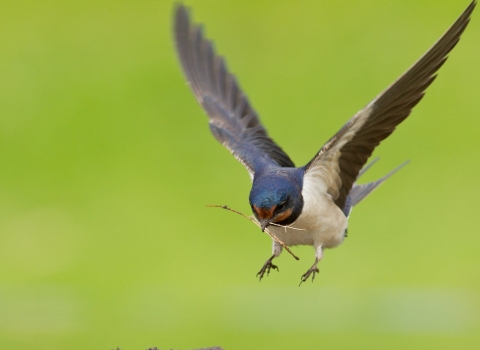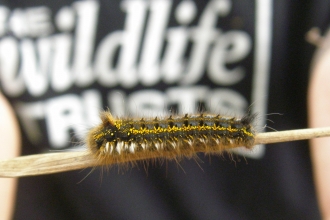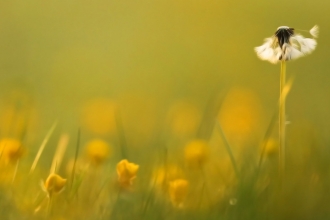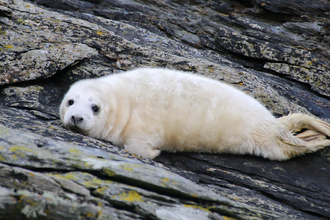Wildlife crime
Wildlife crime can take many forms and it can be difficult to know what constitutes a crime. There are a number of laws and other legislative instruments that exist to protect wildlife on the Isle of Man.
Most are instruments passed under Manx law by Tynwald, but others are international regulations or agreements that the Island is a signatory to. In many cases there is a government department responsible for the licensing and regulation of the various protected species and in most cases it is the Department of Environment Food and Agriculture. Actual contravention of the rules is usually a matter for the Police and the Isle of Man Constabulary Wildlife Crime Officers to investigate and enforce.
Legislation under Manx law
The Wildlife Act 1990
The 1990 Act is the primary wildlife protection legislation in day to day application. It sets out schedules of Manx species of animal and plant that are protected by law from injury or disturbance. It also establishes the legal protection of Areas of Special Scientific Interest and National Nature Reserves. This list of species was revised in 2004, and the Act itself received some amendment under the Agriculture (Miscellaneous Provisions) Act in 2008. Full details are available from the DEFA website.
The Game Acts 1882 - 1971
Set out those species of game that may not be lawfully taken during their respective closed seasons and the manner in which game may be taken.
The Wild Birds Act 1936 (now repealed)
Allowed the designation of Wild Bird Sanctuaries (which remain in force, even though their designating Act has been repealed). New Bird Sanctuaries cannot now be designated, being replaced by Areas of Special Protection and/or Areas of Special Scientific Interest by the Wildlife Act 1990.
Manx Museum & National Trust Acts 1959-1986
Creates the Manx National Trust. Allow for the acquisition of land for its preservation and protection of wildlife thereupon via byelaws.
The Curraghs Acquisition Act 1963
Protects all species of bird and animal from being killed or taken by various means within the Ballaugh Curragh area unless authorised to do so.
Inland Fisheries Act 1976
Section 34 makes it an offence to obstruct any watercourse.
Water Act 1991 & Water Pollution Act 1993
Protect watercourses and drinking water and create byelaws for the prevention of water pollution and water quality objectives. Prohibits deposits of any item at sea.
Tree Preservation Act 1993
This Act makes stringent provision for the preservation of trees and the registration of notable trees. Almost all trees on the Isle of Man are protected, providing a far greater level of protection than in the UK or Republic of Ireland.
The Heath Burning Act 2003
This Act protects all Registered Heathland from burning or destruction without a licence.
The Endangered Species Act 2010
This Act gives effect to the Convention on International Trade in Endangered Species of Wild Fauna and Flora (CITES) in the Isle of Man and its territorial waters, and therefore regulates the import and export of globally endangered species, via a statutory Wildlife Committee. Please note that at the local level, our Manx endangered species are included within Schedule 1, 5 and 7 of the Wildlife Act 1990.
Flood Risk Management Ask 2013
Prohibits the interference with any watercourse.
Marine Infrastructure Management Act 2016
Introduces the requirement for Environmental Impact Assessment at sea in relation to infrastructure.
Animal By-products Regulations 2019
Prohibits animal by-products, including catering waste, being brought on to any premises if farmed animals would have access to such animal byproducts.
Climate Change Act 2021
Creates a statutory duty of Government to protect and enhance biodiversity, ecosystems and ecosystem services. Introduces a planning requirement for the maximisation of carbon sequestration; the minimising of greenhouse gas emissions; the maintenance and restoration of ecosystems; Biodiversity Net Gain; the need for sustainable drainage systems; and the provision of active travel infrastructure. Prohibits the cutting of peat and allows for the protection and restorations of peatlands.
Animal Welfare Act 2024
Protects the welfare of all non-human vertebrates after they are born (exclusions are made for fishing).
How to report Wildlife Crime
Manx Wildlife Trust, as an independent charity, has no statutory or investigative powers. To report Wildlife Crime on the Isle of Man please contact the most appropriate agency listed below (please feel free to copy us in using enquiries@mwt.im) :
1. (All instances) - DEFA Ecosystem Policy: +44 1624 651577 ecopolicy@gov.im
2. (All instances) - Isle of Man Constabulary Wildlife Crime Officers (as of October 2024): PC Darren Loader Darran.Loader@iom.police.uk & PC James Sanderson James.Sanderson@iom.police.uk +44 1624 631212
3. (International wildlife crime, proceeds of wildlife crime or those crimes with a financial or economic element) - the Isle of Man Financial Intelligence Unit: +44 1624 686000 fiu@gov.im
4. (Fisheries - freshwater and marine, including poaching, illegal landings and fishing in closed areas or Marine Nature Reserves) - DEFA Fisheries: +44 1624 685857 fisheries@gov.im
5. (Freshwater and marine pollution) - DEFA Environmental Protection Unit: +44 1624 685885 (For out of hours oil pollution response please contact +44 1624 697327) environmentalprotection@gov.im
6. (Illegal landfill/dumping of waste) - DEFA Environmental Protection Unit: +44 1624 685535 or email environmentalprotection@gov.im
7. (Animal welfare concerns - covering all non-human vertebrates, including pets and livestock) - DEFA Chief Vet: +44 1624 695742 agriculture@gov.im
8. (Agricultural Non-compliance - covering the protection of wildlife, habitats, soil, watercourses, litter/scrap, field boundaries, invasive species, public rights of way, archaeology and use of fertilisers & herbicides on farms) - DEFA Agriculture: +44 1624 695742 agriculture@gov.im
9. (Illegal import/export of endangered or protected species) - DEFA Ecosystem Policy: +44 1624 651577 ecopolicy@gov.im
10. (Illegal tree felling/destruction) - DEFA Forestry: +44 1624 695701 forestry@gov.im
International Conventions and Agreements
Bern Convention
On the Conservation of European Wildlife and Natural Habitats – focusing on scarce and vulnerable species
Bonn Convention
On the conservation of Migratory Species of Wild Animals – covers bats, birds and cetaceans
Convention on International Trade in Endangered Species of Wild Fauna and Flora (CITES)
An international convention to protect against international trade in species threatened with extinction
Ramsar Convention on Wetlands of Importance
Covers the Ballaugh Curragh Ramsar site
Rio Convention on Biological Diversity
Seeks to halt the loss of species and ensure all signatories maintain the diversity of organisms within their territory
Oslo-Paris Convention for the Protection of the Marine Environment of the North East Atlantic (OSPAR)
Sets out to protect the sea against pollution and the adverse effects of human activities and to restore marine ecosystems and habitats
Additional information on all these International Conventions are available online or from DEFA.
Manx protected species
Birds
All species of bird are protected from killing or disturbance while nesting and over 70 species of bird receive additional protection against disturbance or injury under the Wildlife Act. In addition, many of the international conventions cover bird species.
Seals
All species are protected under the Wildlife Act
Whales and dolphins (cetaceans)
All species are protected under the Wildlife Act, the Bonn Convention and to a degree by OSPAR
Bats
All species are protected from injury or disturbance by the Wildlife Act as well as migratory species covered by the Bonn Convention
Basking Shark
Protected under the Wildlife Act and the Bonn Convention
Frogs
Our only native species of amphibian, they receive protection under the Wildlife Act
Lizard, common
Our only native species of reptile, they receive protection under the Wildlife Act
Invertebrates
Two species of moths, three species of crickets and grasshoppers and the lesser beefly are protected under the Wildlife Act
Plants
All wild plants are protected against unauthorised persons uprooting them. In addition, all Orchids and 75 other rare species of plant receive additional protection by the Wildlife Act against being picked or destroyed




